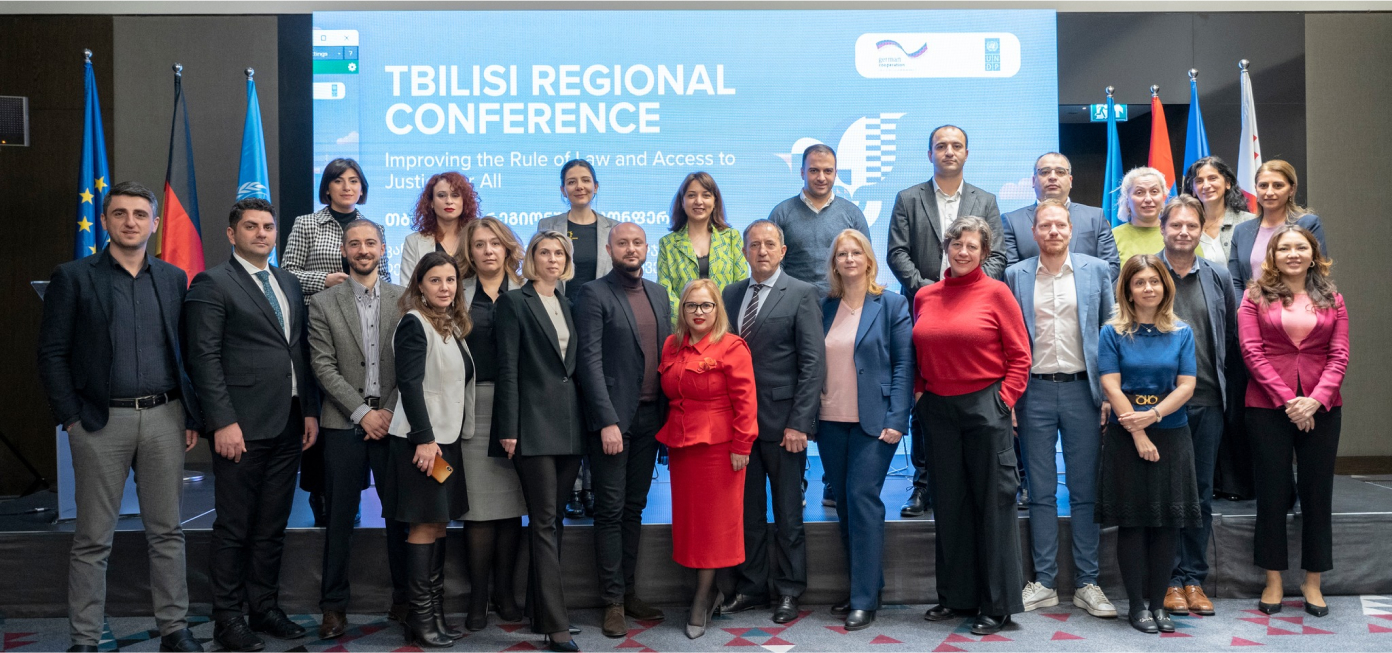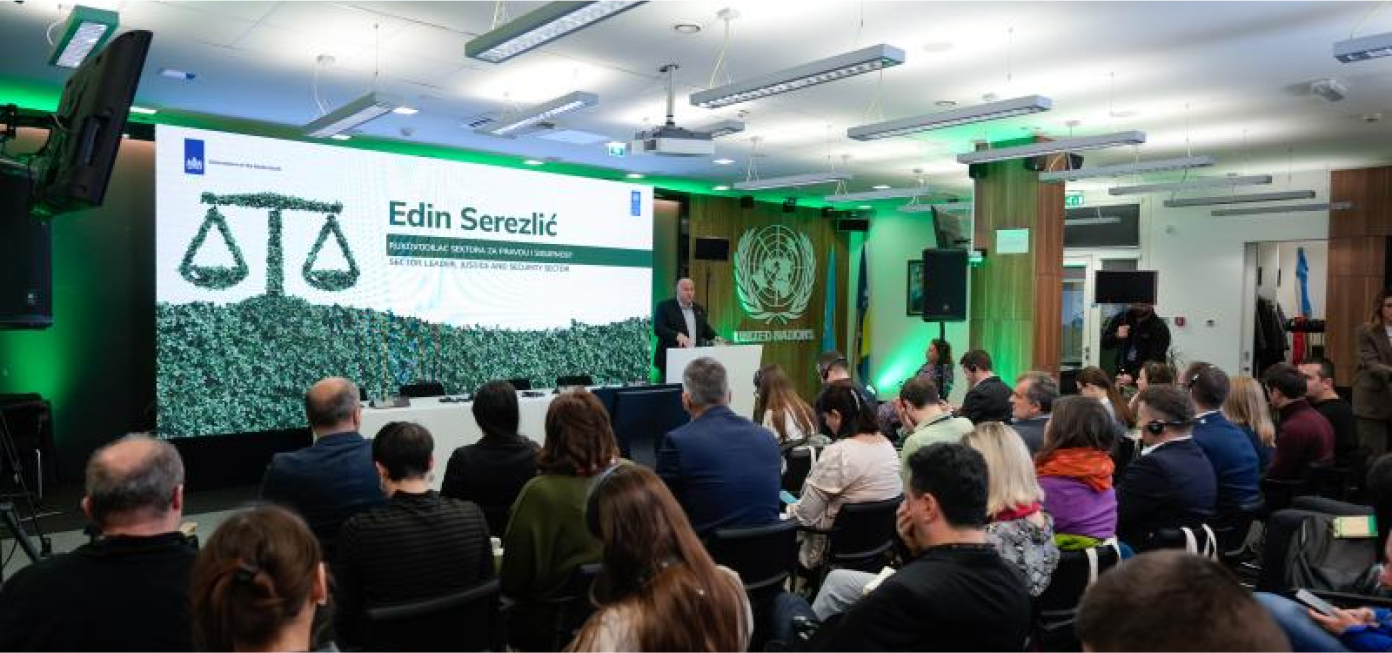OVERVIEW OF THE REGIONAL CONTEXT
The Europe and Central Asia region has experienced multiple crises and a profound reshaping of its geopolitical landscape for peacebuilding, democracy, the rule of law and security. Ongoing armed conflicts have significantly disrupted regional stability and challenged the rule of law. The Eastern European nations have experienced a significant (6.9 percent) decline in peace since 2008, 1 largely due to escalating conflicts, particularly the war in Ukraine. The conflicts have led to mass displacements, 2 increased pressures on governments and communities, and heightened social tensions exacerbated by misinformation. Millions of displaced people continued to experience a lack of quality legal protection and were subjected to injustice and discrimination. The region also had mixed progress in the rule of law and democratic governance, with lingering undemocratic tendencies and centralized economies affecting democratization and reforms. 3 Civic space continued to shrink in 2023, accompanied by political polarization processes and a rise in hate speech and misinformation. At the same time, the opening of the European Union (EU) accession negotiations with Bosnia and Herzegovina, Moldova and Ukraine, and the granting of candidate status to Georgia created a unique dynamic for accelerating the rule of law reforms. 4
In this context, UNDP focused its regional efforts on fostering stability, strengthening the rule of law and human rights protection, and enhancing cross-border cooperation.
JUSTICE FOR DISPLACED POPULATIONS
Ensuring access to justice in the context of mass displacement caused by the war in Ukraine and other conflicts was a regional priority for UNDP. In December 2023, UNDP facilitated the adoption of The Tbilisi Declaration on Access to State-Guaranteed Legal Aid For Forcibly Displaced Populations, signed by legal aid authorities of Armenia, Georgia, Moldova and Ukraine. The declaration set new regional standards for access to justice and rights-based legal protection for displaced communities. UNDP aims to support national partners in implementing this declaration as part of its commitment to the 2023 Joint Legal Community Pledge to increase refugees' access to legal services.
SUPPORT TO NATIONAL HUMAN RIGHTS INSTITUTIONS
To reinforce the institutional foundations for upholding human rights and the rule of law in the region, UNDP supported and built the capacities of national human rights institutions (NHRIs). In 2023, UNDP, in partnership with the UN Human Rights Office (OHCHR), the European Network of NHRIs, and the Asia Pacific Forum of NHRIs, conducted joint capacity assessments of NHRIs in Kazakhstan, Turkmenistan and Ukraine. As a result of these assessments, NHRIs could review their capacity gaps and develop actions to better align with international standards, in particular, with the Paris Principles.

The Tbilisi conference, supported by UNDP and Germany, created a collaborative platform to strengthen institutions and ensure access to legal aid for all.
Photo: UNDP Giorgi Shengelia.
ENVIRONMENTAL JUSTICE
UNDP continued to expand its environmental justice programming by implementing projects in Bosnia and Herzegovina, Georgia, Kyrgyzstan, 5 and supporting two sub-regional events: the for the authorities and UNDP Country Offices from the Western Balkan and the International Conference of Judges in Environmental Justice that brought together representatives of the judiciary from Central Asia. These events were instrumental in stimulating regional exchange on emerging judicial practices and the international standards of environmental rights’ protection. Both forums were held in close collaboration with global and regional partners such as the United Nations Environment Programme (UNEP) and the United Nations Economic Commission for Europe (UNECE), serving as the Aarhus Convention’s Secretariat.

The Regional Western Balkans Meeting on Environmental Justice for the authorities and UNDP Country Offices from the Western Balkans.
Photo: UNDP
TRANSITIONAL JUSTICE
In 2023, UNDP significantly expanded its support for transitional justice in the Western Balkans with a comprehensive EU-funded project. This initiative aimed to enhance accountability for war crimes, improve victim support mechanisms, and foster cross-border cooperation and inter-ethnic dialogue about past conflicts. Key accomplishments included partnerships with over 40 local civil society organizations (CSOs) to facilitate victims' access to justice and reparations, promoting societal dialogue, and training for journalists and lawyers. The project also facilitated cross-border cooperation in war crimes proceedings, leading to accelerated evidence exchange and case transfers. Additionally, it contributed to the development of gender-responsive justice strategies and extended support to judicial partners in Ukraine, demonstrating its commitment to fostering accountability and healing in the region.
BUSINESS AND HUMAN RIGHTS
In the area of business and human rights (B+HR), supported by the Government of Japan, UNDP delivered training for over 300 companies in Kazakhstan, Kyrgyzstan, Türkiye and Ukraine on human rights due diligence and also worked with the governments to lay the foundation for the development of the National Action Plans (NAPs) on B+HR. As a result, Ukraine launched the National Human Rights Strategy, which includes a clause to implement the UN Guiding Principles on Business and Human Rights (UNGPs), while the Cabinet of Ministers of the Kyrgyz Republic committed to adopt the NAP. Furthermore, Kazakhstan, Kyrgyzstan and Türkiye developed National Baseline Assessments on B+HR with the support of UNDP, and the same activities are underway in Azerbaijan and Serbia.
To advocate for the adoption and implementation of UNGPs in the region, UNDP published two studies: The Status of the Implementation of the UNGPs on Business and Human Rights in Europe and Central Asia (downloaded over 500 times) and The Impact of Digital Technology on Human Rights in Europe and Central Asia (downloaded over 700 times). Furthermore, UNDP delivered corporate human rights-based approach (HRBA) training for over 100 people, including UNDP staff and national authorities in Azerbaijan and Georgia.
ARMS CONTROL
Through its SEESAC project on disarmament, arms control and gender equality in South East Europe, UNDP continued to pioneer innovative solutions to help governments reduce the arms flows. Most notably, by focusing on the regional approach to the small arms and light weapons (SALW) control through the Western Balkans Roadmap initiative, which UNDP is facilitating in close cooperation with the EU and governments in the Western Balkans, Germany and France. The approach has received global recognition and is being replicated in other regions. 6
Lessons learned and good practices
UNDP's regional engagements have highlighted critical lessons for future initiatives, particularly the necessity for collaborative and tailored approaches in crisis contexts. For instance, the displacement crisis in Ukraine emphasized the need for joint efforts between national authorities and local communities across the borders to offer sustainable legal protection for the displaced populations, an effort that will be furthered by initiatives like the Tbilisi Declaration 2023.
In Western Balkans, the success of the SALW programming showcased the importance of initiatives designed to meet the unique circumstances and priorities of each region, such as the establishment of dedicated trust funds and strengthening of national monitoring mechanisms.
Building partnerships with local CSOs and facilitating cross-border cooperation are essential for justice and reconciliation in transitional justice processes. Collaborative support of UNDP, OHCHR and regional networks for NHRIs has proven to be effective in reinforcing the resilience and strategic planning of NHRIs, whose capacities are tested against challenges like declining rule of law and conflicts.
The environmental justice work further underscored the need for structured capacity building and integrated programming.
Lastly, the region’s increased demand for aligning business operations with human rights standards, also impacted by EU regulatory pushes, points to the importance of upscaling further the multitude of partnerships which would offer comprehensive support to states, communities, and businesses, especially in conflict-affected contexts.
Looking forward
Amidst ongoing conflicts, promoting access to justice for displaced populations will remain a priority.
In the framework of the Tripartite partnership, UNDP will launch regional activities to support the national human rights institutions of Georgia, Moldova, North Macedonia and Ukraine.
Through the new regional project, Greening the future and advancing rights, UNDP will support transformative local democracy and green transition approaches in the Eastern Neighbourhood countries, focusing on rights-based practices.
To highlight the importance of responsible business in line with human rights standards for sustainable economic development in the region, UNDP will arrange the 4th UN Regional Forum on Business and Human Rights in Istanbul and design sub-regional initiatives.
A series of guides are in the pipeline for 2024, including on human rights impact assessments in data-driven AI systems and on civic space protection.
Global Peace Index 2023, available at https://www.visionofhumanity.org/wp-content/uploads/2023/06/GPI-2023-Web.pdf.
According to UNHCR, "the number of refugees seeking protection across Europe is expected to remain stable at around 5.9 million”, https://reporting.unhcr.org/operational/situations/ukraine-situation. Furthermore, the independent sources claim that “as of December 2023, an estimated 3.7 million persons were living in internal displacement within Ukraine, with 80 percent of all IDPs having been displaced for longer than one year and 39 percent of all IDPs displaced more than once”, https://www.migrationdataportal.org/ukraine/crisis-movements. Furthermore, “Türkiye currently hosts some 3.6 million registered Syrian refugees along with close to 320,000 persons of concern from other nationalities”, available at https://www.unhcr.org/tr/en/refugees-and-asylum-seekers-in-turkey.
Overview of the regional rule of law ranking is available at https://worldjusticeproject.org/rule-of-law-index/global.
See a Press Release of 8 November 2023, “Commission adopts 2023 Enlargement package, recommends to open negotiations with Ukraine and Moldova, to grant candidate status to Georgia and to open accession negotiations with BiH, once the necessary degree of compliance is achieved”, available at https://ec.europa.eu/commission/presscorner/detail/en/IP_23_5633.
All references to Kosovo shall be understood to be in the context of Security Council resolution 1244 (1999).
The latest Annual Report of the UN Secretary-General on Small Arms and Light Weapons highlights the impact of the Western Balkans Roadmap, referring to the Roadmap Multi-Partner Trust Fund and findings of the Roadmap Mid-Term Review. Additionally, it highlighted the Roadmap's influence on the development of new initiatives in the Caribbean and Central America, signalling its broader significance and relevance in addressing regional challenges, https://documents.un.org/doc/undoc/gen/n23/287/99/pdf/n2328799.pdf?token=vDPkayFcSPHMQzeSoL&fe=true.